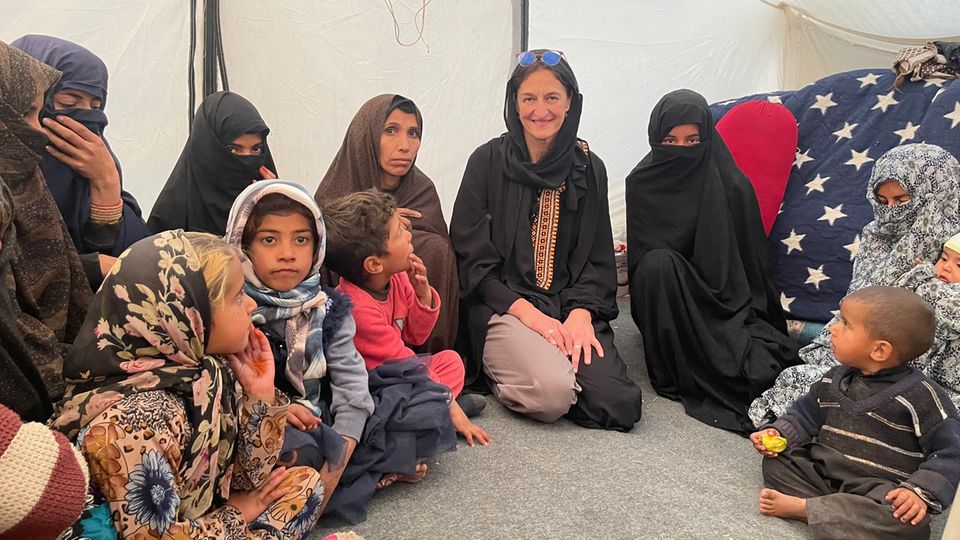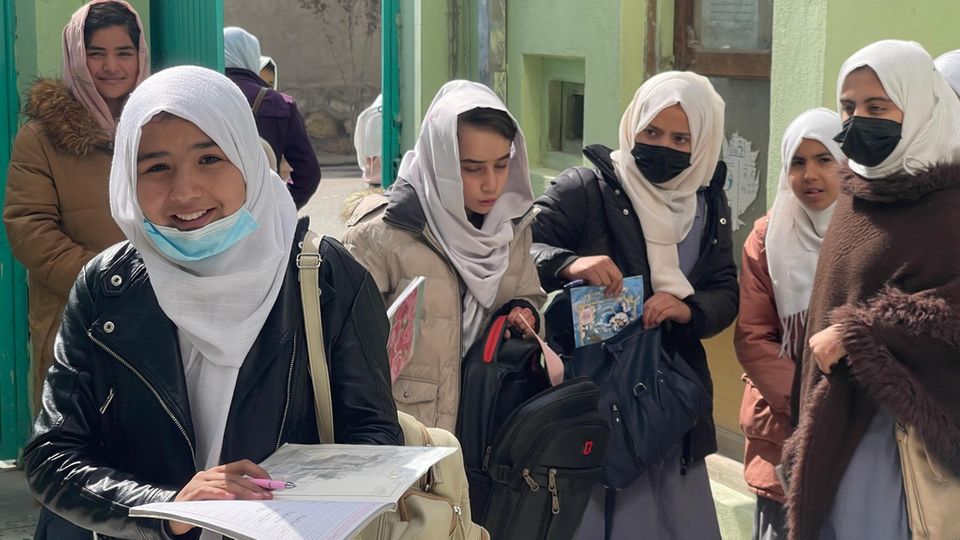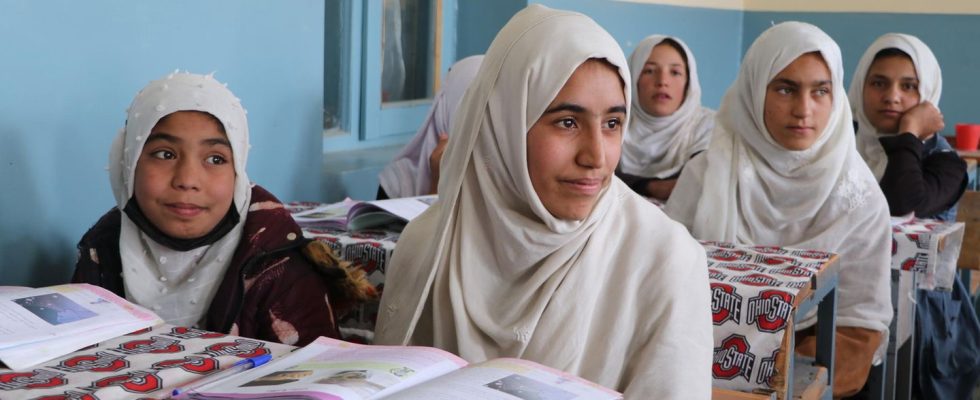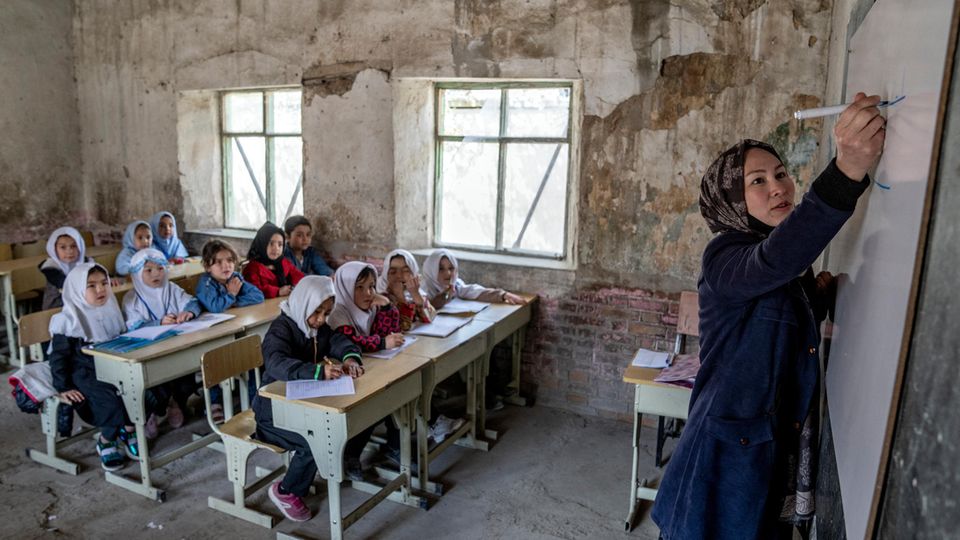Women’s rights
Education banned: Schoolgirls in Afghanistan suffer under the Taliban
They are allowed to go to school until the end of sixth grade: Afghan primary school students
© Christina Ihle
The new school year started in Afghanistan on Wednesday. Even in the third year, girls are forbidden from attending secondary schools. Development worker Christina Ihle observed on site that they would like to do so.
They want to become a teacher or an engineer. Doctor, architect, lawyer. But the girls have been in for three years Afghanistan was forbidden from attending secondary schools and their life plans had to evaporate into dreams. The new school year began across the country on Wednesday, opening with a ceremony in Kabul. But the bells that were rung according to tradition only rang for the boys and young men. Girls no longer have the right to education. You are not allowed to move in public spaces. Not working. They have lost their voice.
Afghanistan is the only country in the world that prohibits girls from attending school after primary school. They are allowed to attend classes until the end of sixth grade, after which they must stay at home. Some people repeat a school year so that they can learn a little longer and meet friends. But when they are 12 or 13 years old, at the latest when their menstruation begins, they exchange their freedom for a life in closed rooms.
Girls and women have no access to the internet
Christina Ihle experiences what this means for her. She is the managing director of the Afghan Women’s Association in Hamburg, which runs five schools for more than 5,000 students. In February she visited some of them, traveling from province to province and speaking to village elders, parent councils and local authorities. Christina Ihle observed that no one seems happy about the Taliban’s decree. Nor the men who still have the say in a patriarchal society today. They are also looking for solutions to be able to continue teaching the girls. Online offerings can hardly compensate for this disadvantage in education. In many rural regions, girls and women do not have access to the Internet and are not allowed to own cell phones. Not even all teachers.

Development worker Christina Ihle next to an Afghan family. The girl next to her (right) was forced into marriage a week after she left.
© Afghan Women’s Association/Wahidullah Ezatmal
When they came to power again in August 2021, the radical Islamic Taliban initially announced that they would be less harsh than during their first rule from 1996 to 2001. Since then, however, the militia has become increasingly radical. The fact that the Afghan Women’s Association can continue to do its work is due to the support of the local population, says Christina Ihle. Two years ago, the program of the radio station “Begum” was launched, which broadcasts the learning material for grades seven to twelve in the mornings at different times, seven days a week, in all provinces. Christina Ihle and her colleagues therefore distributed radios and textbooks to schools and encouraged the older girls to take part.
Some girls are sent to beg instead of going to school
Without lessons, everyday life for older girls is monotonous, even more so in the country than in the city. They get up at five in the morning, look after animals such as cows and sheep and take care of breakfast. They would start walking to school around seven o’clock. Classes begin at eight and now only her brothers and cousins are allowed to attend. It’s a long day that has to be spent within your own four walls, even if the families are large and there is always someone around you. Even if the girls are allowed to go outside, into the yard adjacent to the house. Some of them are sent to beg. Others look after the little ones Siblings, while the mother washes the neighbors’ laundry or helps elsewhere around the house.

They are still doing well because they are allowed to go to school. What comes after primary school is uncertain. Only medical colleges have reopened to women.
© Christina Ihle
Since the Taliban came to power, many people have lost their jobs. The estimated unemployment rate in 2023 was 15.38 percent. More and more people are selling their kidneys, says Christina Ihle, for which they get around $300 on the black market. More and more children are working, and younger and younger girls are being forced into marriage: “If a family with eight children has already lost one through malnutrition, then there is often no other choice than to marry off a daughter. The bride price feeds the siblings,” says Christina Ihlen. While the age of girls who were forced into marriage used to be 15 or 16 years old, today 12-year-olds are being married.
Secret lessons? Only with the OK of the village elders
It is likely that families will band together and have their daughters educated privately in living rooms, a risky undertaking. Secret teaching only works if the village elders tolerate it. However, the girls cannot take an exam and their career prospects remain uncertain. The future of the female students, who have been banned from entering state universities since December 2022, remains similarly vague.
13 images
Only medical colleges have recently reopened to women, a new decree from the de facto government. Due to the rigid gender segregation, women are only allowed to be treated by women. That’s why nurses, midwives and doctors are needed, also in the future. “This is an urgently needed step for better mother-child care in Afghanistan, which currently has one of the highest mortality rates among pregnant women and young children in the world,” says Christina Ihle. Most girls would want to become a nurse or midwife. The Afghan Women’s Association immediately registered 40 high school graduates from its own schools for the entrance exams, and they all passed. Now they are only looking for people to support them with a scholarship.



